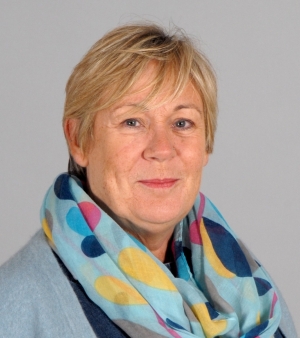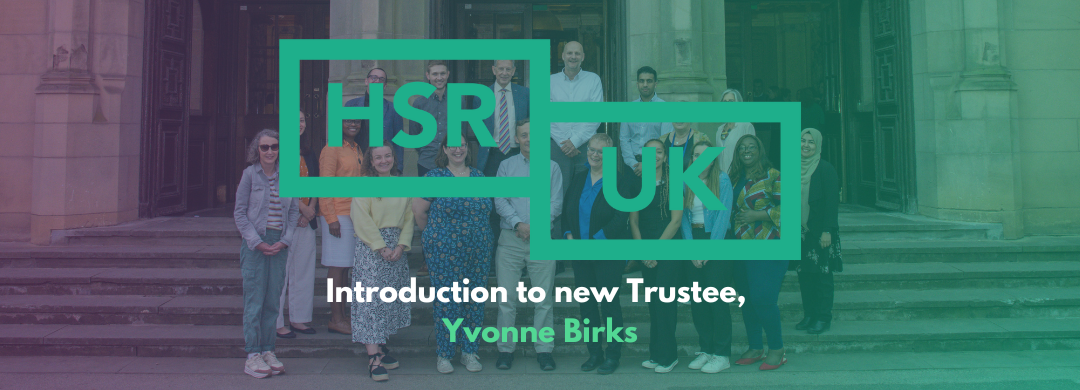We are so pleased to welcome Yvonne Birks to our HSR UK Board of Trustees! In this interview, Yvonne introduces herself to the HSR UK community and offers some insights into what she hopes to achieve during her time with us...
How did you first get involved in the HSR community?
I have been involved in the HSR community since 1999 when I took my first job on a trial of hip protector pants in a community dwelling elderly population, and the glamour has only increased since then. I had a part time post and recruited 4500 women through GP practices, hand stuffed all the recruitment materials and did all the data input and analysis. Those were the days! I was a nurse for 10 years before leaving to study for my BSc and DPhil full time and I think that has always helped me to see how designs might play out in practice. I worked on a variety of health services research majoring on patient safety before moving into social care research 10 years ago.
What research areas do you see becoming a priority for the HSR community in 2024?
I would say this wouldn’t I, but I really do think social care is an area that is on the ascendancy. COVID shone a light on social care and the inter dependency with health is evident. The Department of Health is now the Department of Health and Social Care, NIHR have demonstrated their commitment to social care research and now include care as well as health in their name with substantial dedicated funding and programmes. There are pure social care questions but increasingly the aspiration for integrated services means many questions need to think about designs, interventions, populations, and outcomes in both sectors. We should remember that individual members of the public really want to think about one system not the separation of the sectors which causes them a great deal of confusion in many cases. Integrated working is likely to be important and particularly in relation to older people. Keeping people at home for as long as possible, preventing admission to hospital, then getting people home and reabled are all really important.
What made you want to become a HSR UK Trustee?
I have always been engaged with the activity of HSR UK and enjoyed the trajectory it has taken over time, supporting methods and the conduct of excellent research and the community it provides. Meeting other researchers at the conference is exciting and stimulating and I felt I wanted to be part of the community in a more strategic way to support activity and future directions. It has been gratifying to see a growing social care research presence and I wanted to help to develop this further within the board of trustees.
What do you hope to achieve in your time as a Trustee?
It’s early days and I am sure the board will have their own ideas about how I can support the work of HSR UK. This said I really hope to be able to expand the remit to make social care researchers feel welcome in the HSR research community and to support. I am committed to raising the methodological rigour and profile of this community of practice and I see real benefits in supporting more integration between health and social care researchers since we share areas of priority and methods. In many ways there are similarities, but the contexts are different and ensuring that this is understood will help to support a wider community of integrated research. I have been very involved in helping to do this at NIHR and supporting DHSC in better understanding the research landscape in social care and I hope that is what I can support on the board.
What do you see as the benefits of better integrated work between health and social care services research?
In 2013 I made the move to social care, an area I am passionate about, and while there are similar methodological approaches in health and social care research, the context does pose different opportunities and challenges, and it is important that these are addressed to make sure the HSR and social care communities can integrate to answer questions which span the real lives of people who are often navigating both systems. The truth is that people using social care are almost always also navigating healthcare and the different systems are confusing to people and families who get caught up in a care journey where they are asked the same questions over and over again; they do not understand why the two sectors cannot communicate and this is particularly acute for our growing elderly population. Integrated working should really impact on the day to day lives of people using both services including public health and primary care. The more we are able to examine questions holistically the better the experiences should be for people in the system and the workforce.
How do you think the HSR space can better accommodate social care research in the future?
One of the challenges we have faced in the past is the view that social care only exists to save health services money. Recognising the contribution of social care services, understanding the breadth of what social care is, why simple translation of methods and systems from health may not be easy and recognising the differences in the contexts will all help researchers from HSR and social care to work in collaboration and complementarity. However, that means we need representation within the HSR community to help to point out where this needs to happen. HSR UK is already making real in roads in welcoming social care research into its remit and I think we will start to see benefits for both communities from these efforts.
I’m very much looking forward to playing a role in this.

Yvonne Birks is a professor of Applied Social Care Research at the University of York and an executive director of the NIHR School for Social Care Research. She has a professional background in nursing and worked in patient safety safety research before moving to social care in 2013. Her interests are in the social care workforce, older people, self funding, carers and dementia. She directs an NIHR HS&DR partnership, The Curiosity Partnership, which is a partnership between 4 local authorities and 4 Universities in Yorkshire and Humber to build research capacity in adult social care.

